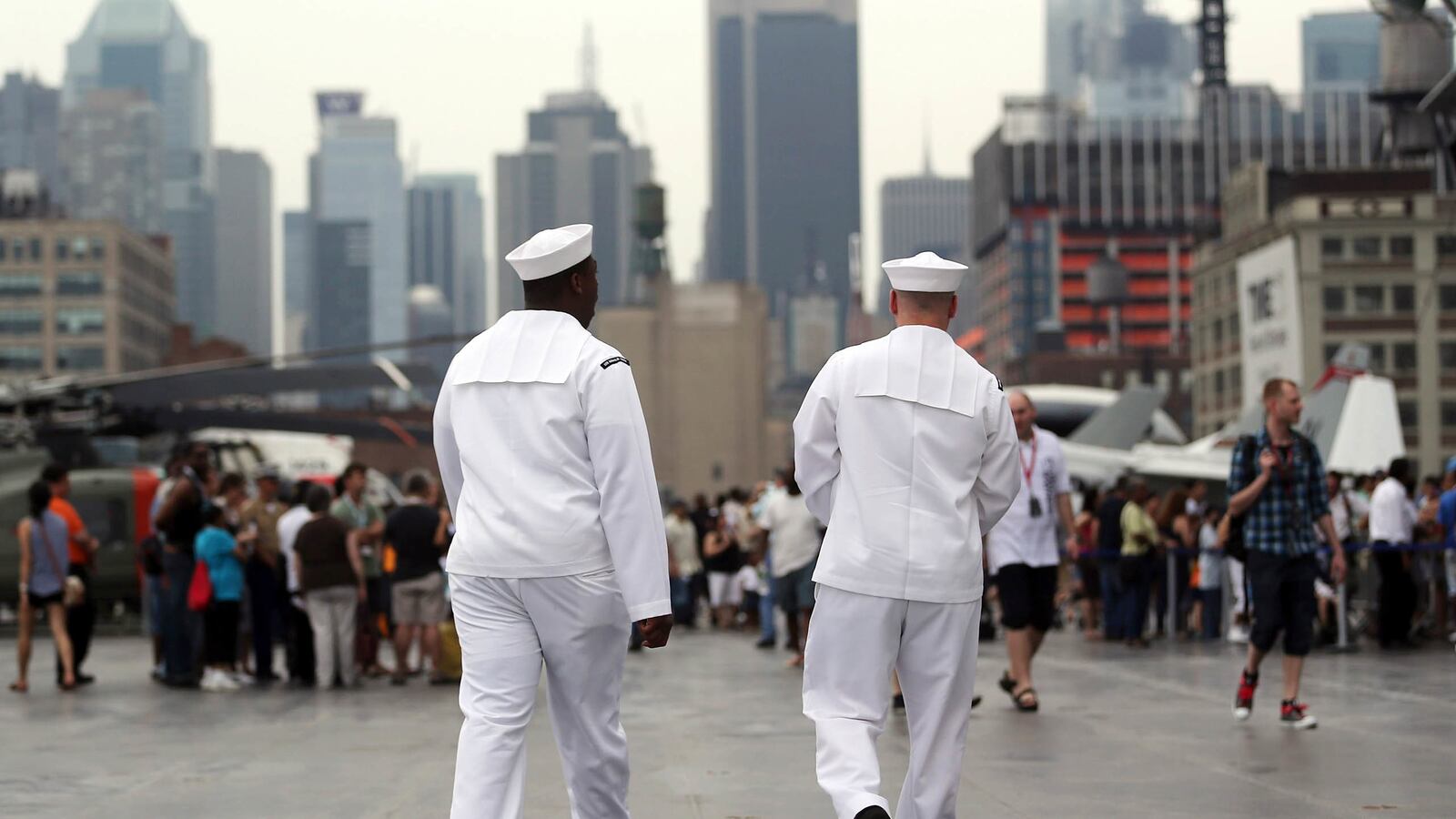The effects of the sequestration are being felt far and wide—from the sands of San Diego to the bars of New York City.

Each May since 1984, thousands of sailors clad in white uniforms have hit the streets of New York City for Fleet Week. An iconic festivity memorialized in countless black-and-white photos and one Sex and the City episode, the event marks a time of celebration. Locals and tourists get a chance to visit ships. And they flock to bars, offering to buy rounds for sailors on shore leave.
But this year the number of Navy visitors will plummet to zero. As the sequester continues to subject the military to budget cuts, the Navy announced Wednesday its cancellation of Fleet Week for the year. New York City’s bars and restaurants—not to mention its legions of Carrie Bradshaw wannabes—are going to feel the change the most.
According to New York City officials, Fleet Week brings $20 million in revenue to the city annually. That’s money spent directly at bars and restaurants and cash that spills into city offers indirectly through tax revenue.
“It’s obviously a tremendous social event for not only the sailors but people all around the city. The bars and restaurants are packed and do good business,” said Andrew Moesel, a spokesman for the New York Restaurant Association.
But the celebratory event isn’t easy or cheap to pull off—last year 6,000 sailors visited the Big Apple. With the challenges faced by this year’s sequester, Navy officials nixed Fleet Week entirely. “Unfortunately, there will be no Navy ships in New York this year for Fleet Week and no additional sailors or Marines,” the Navy’s director of public affairs, Beth Baker, wrote in a statement posted on the New York Fleet Week website. “We look forward to the opportunity to participate in future Fleet Weeks and we greatly appreciate the city’s patience and understanding during these unusual times.”
Despite the blow to tourism in the city, Mayor Michael Bloomberg told reporters that he’s had to accept the Navy’s decision. “This is something paid for by the federal government, and they’ve got to make decisions in terms of deploying their resources, I assume, to protect the country or deploying their resources to advertise that these are great careers, join the military services,” Bloomberg said Wednesday.
But to some restaurant and bar owners who rely on the 29-year-old event for annual income, its disappearance won’t be as easy to fathom. “One of the most difficult parts of running a restaurant is keeping the cash flow, which can be erratic,” Moesel said. “Restaurants count on events like Fleet Week to give them much-needed revenue especially in the spring after coming from a slow winter season.” Fleet Week has been suspended in other locations in the U.S., including San Diego and San Francisco, where port calls for Navy ships and air shows were canceled.
After a disjointed year with Hurricane Sandy, the cancellation of the New York City Marathon, and now the termination of fleet week, restaurateurs may be feeling pinched pockets from the void of events. At locations like McSorley’s Old Ale House, listed as a top destination for Fleet Week drinking on Yelp, this season will be slower without the sailors. “It’s going to affect business and that’s to be expected,” said Steven Dwarycuk, a day manager at McSorley’s in the East Village. “There are several thousands of people who come in. It’s a great week for us.”
But some bar owners say the cancellation of fleet week won’t bring about as much change as it would have in years past. “If this was 1999 and 1998, and we had tens of thousands of these sailors all over the city, especially in Hell’s Kitchen, because that’s where the ships are docked, I would say, oh, my God, that would be dramatic,” said Dan McLaughlin, owner of the Pony Bar in the Hell’s Kitchen neighborhood. “But it’s dwindled so much over the years that really it’s nothing.”
Mitchell Moss, a New York University professor of urban policy and planning, says the cancellation of Fleet Week will be noticeable, but not pivotal. “The sailors aren’t big spenders, and I don’t think the prostitutes will suffer or the bars will suffer or the energy in our streets will suffer,” he said. “I think some of the bars near the ships will feel it. There’s no question. But the overall New York economy is quite strong.”






